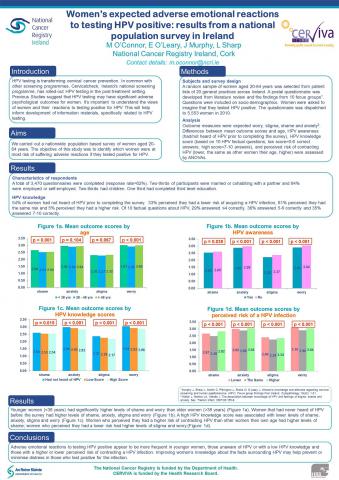Current Size: 100%
Women’s expected adverse emotional reactions to testing HPV positive: results from a national population survey in Ireland
Background: HPV testing is transforming cervical cancer screening. Undergoing a HPV test may provoke adverse emotional reactions for women. In a population survey, we investigated women’s expected responses to testing HPV positive.
Methods: A questionnaire was mailed to 5,553 women aged 20-64 years recruited through primary care. Women were asked to imagine that they had tested positive for HPV. Outcome measures were expected worry, stigma, shame, and anxiety1. Mean scores for each outcome were compared by age, awareness of HPV, HPV knowledge score (based on 10 factual questions about HPV infection), and perceived risk of contracting a HPV infection.
Results: 3,470 women participated (response rate=62%). 54% had not previously heard of HPV. Of those answering the HPV knowledge questions, 29% answered ≤ 4 correctly, 36% answered 5-6 correctly and 35% answered 7-10 correctly. The mean worry score was significantly higher in younger (<38) than older (>48) women (p<0.001). Younger women also had higher levels of shame (p<0.001), but not stigma or anxiety.Women with no prior awareness of HPV had significant higher levels of worry, stigma, shame and anxiety (all p<0.001). A low HPV knowledge score was associated with higher levels of stigma (p=0.006) and anxiety (p=0.009), but not shame or worry. Women who perceived they had a higher risk of contracting HPV than other women their own age had higher levels of shame (p=0.012), anxiety (p=0.002) and worry (p=0.003).
Conclusions: Adverse emotional reactions to testing HPV positive may be more frequent in younger women, those unaware of HPV or with low HPV knowledge, and those with higher perceived infection risk. Improving women’s knowledge about the facts surrounding HPV could help minimise distress in those who test positive.
1Waller J, Marlow LA, Wardle J. The association between knowledge of HPV and feelings of stigma, shame and anxiety. Sex Transm Infect. 2007;83:155-9.






